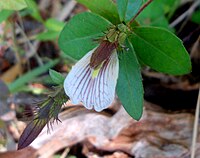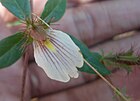Note: This is a project under development. The articles on this wiki are just being initiated and broadly incomplete. You can Help creating new pages.
Difference between revisions of "Blepharis maderaspatensis - Creeping Blepharis"
(→External Links) |
|||
| (3 intermediate revisions by the same user not shown) | |||
| Line 1: | Line 1: | ||
| + | [[File:(Blepharis maderaspatensis) at Kambalakonda 08.JPG|200px|thumb|right]] | ||
'''Blepharis maderaspatensis''' is a Prostrate, Creeping, Wiry plant. It will rooting at the nodes. It is seen commonly on Slopes among rocks and Poor gravelly soil on the hills up to 1,400 m. | '''Blepharis maderaspatensis''' is a Prostrate, Creeping, Wiry plant. It will rooting at the nodes. It is seen commonly on Slopes among rocks and Poor gravelly soil on the hills up to 1,400 m. | ||
==Uses== | ==Uses== | ||
| Line 57: | Line 58: | ||
==Photo Gallery== | ==Photo Gallery== | ||
<gallery class="left" caption="" widths="140px" heights="140px"> | <gallery class="left" caption="" widths="140px" heights="140px"> | ||
| − | + | (Blepharis maderaspatensis) at Kambalakonda 02.JPG | |
| + | (Blepharis maderaspatensis) at Kambalakonda 07.JPG | ||
| + | Blepharis maderaspatensis 5Dsr 1-0672-01.jpg | ||
| + | Blepharis maderaspatensis MS 2057.JPG | ||
</gallery> | </gallery> | ||
==References== | ==References== | ||
<references> | <references> | ||
| − | |||
<ref name="chemical composition">Journal Paper from National Library of Medicine - Phenolic Compounds from the Aerial Parts of Blepharis linariifolia Pers. and Their Free Radical Scavenging and Enzyme Inhibitory Activities</ref> | <ref name="chemical composition">Journal Paper from National Library of Medicine - Phenolic Compounds from the Aerial Parts of Blepharis linariifolia Pers. and Their Free Radical Scavenging and Enzyme Inhibitory Activities</ref> | ||
| − | |||
<ref name="Leaf">[Morphology]</ref> | <ref name="Leaf">[Morphology]</ref> | ||
| − | |||
<ref name="How to plant/cultivate">[Cultivation]</ref> | <ref name="How to plant/cultivate">[Cultivation]</ref> | ||
| − | + | <ref name="Common names">Flowers of india Portal</ref> | |
| − | |||
| − | <ref name="Common names"> | ||
| − | |||
| − | |||
<ref name="Karnataka Medicinal Plants">”Karnataka Medicinal Plants Volume-3” by Dr.M. R. Gurudeva, Page No.356, Published by Divyachandra Prakashana, #6/7, Kaalika Soudha, Balepete cross, Bengaluru</ref> | <ref name="Karnataka Medicinal Plants">”Karnataka Medicinal Plants Volume-3” by Dr.M. R. Gurudeva, Page No.356, Published by Divyachandra Prakashana, #6/7, Kaalika Soudha, Balepete cross, Bengaluru</ref> | ||
</references> | </references> | ||
Latest revision as of 14:05, 3 September 2023
Blepharis maderaspatensis is a Prostrate, Creeping, Wiry plant. It will rooting at the nodes. It is seen commonly on Slopes among rocks and Poor gravelly soil on the hills up to 1,400 m.
Contents
- 1 Uses
- 2 Parts Used
- 3 Chemical Composition
- 4 Common names
- 5 Properties
- 6 Habit
- 7 Identification
- 8 List of Ayurvedic medicine in which the herb is used
- 9 Where to get the saplings
- 10 Mode of Propagation
- 11 How to plant/cultivate
- 12 Commonly seen growing in areas
- 13 Photo Gallery
- 14 References
- 15 External Links
Uses
Wounds, Mouth ulcer, Bone's Fracture, Nerve weakness[1].
Parts Used
Chemical Composition
It contains the following constituents Diphenyl, Picrylhydrazyl and The Enzymes α-glucosidase, Porcine Pancreatic Lipase, Mushroom Tyrosinase were purchased from Sigma Aldrich.[2]
Common names
| Language | Common name |
|---|---|
| Kannada | ಕೂಡಲಿ ಸೊಪ್ಪು Koodali soppu, Uttangani |
| Hindi | Dudhiya choti, Utangan |
| Malayalam | Elumbotti, Hemakanthi |
| Tamil | Netirapundu |
| Telugu | Anthrinta-pullu |
| Marathi | Madrashi kate maka |
| Gujarathi | Chopani vel, Utigan |
| Punjabi | NA |
| Kashmiri | NA |
| Sanskrit | Uttangana |
| English | Creeping blepharis, Madras blepharis |
Properties
Reference: Dravya - Substance, Rasa - Taste, Guna - Qualities, Veerya - Potency, Vipaka - Post-digesion effect, Karma - Pharmacological activity, Prabhava - Therepeutics.
Dravya
Rasa
Guna
Veerya
Vipaka
Karma
Prabhava
Habit
Identification
Leaf
| Kind | Shape | Feature |
|---|---|---|
Flower
| Type | Size | Color and composition | Stamen | More information |
|---|---|---|---|---|
| Flowering from August to December |
Fruit
| Type | Size | Mass | Appearance | Seeds | More information |
|---|---|---|---|---|---|
| Fruiting from August to December |
Other features
List of Ayurvedic medicine in which the herb is used
Where to get the saplings
Mode of Propagation
[[:Category:Index of Plants which can be propagated by |]]
How to plant/cultivate
Commonly seen growing in areas
Dry deciduous forests, In the plains.
Photo Gallery
References
- ↑ 1.0 1.1 ”Karnataka Medicinal Plants Volume-3” by Dr.M. R. Gurudeva, Page No.356, Published by Divyachandra Prakashana, #6/7, Kaalika Soudha, Balepete cross, Bengaluru
- ↑ Journal Paper from National Library of Medicine - Phenolic Compounds from the Aerial Parts of Blepharis linariifolia Pers. and Their Free Radical Scavenging and Enzyme Inhibitory Activities
- ↑ Flowers of india Portal
- ↑ [Morphology]
- ↑ [Cultivation]
External Links
- Ayurvedic Herbs known to be helpful to treat Wounds
- Ayurvedic Herbs known to be helpful to treat Mouth ulcer
- Ayurvedic Herbs known to be helpful to treat Bone's Fracture
- Ayurvedic Herbs known to be helpful to treat Nerve weakness
- Herbs with Leaf used in medicine
- Herbs with Seed used in medicine
- Herbs with common name in Kannada
- Herbs with common name in Hindi
- Herbs with common name in Malayalam
- Herbs with common name in Tamil
- Herbs with common name in Telugu
- Herbs with common name in Marathi
- Herbs with common name in Gujarathi
- Herbs with common name in Sanskrit
- Herbs with common name in English
- Habit - Herb
- Index of Plants which can be propagated by
- Herbs that are commonly seen in the region of Dry deciduous forests
- Herbs that are commonly seen in the region of In the plains
- Herbs




